A former school teacher with 38 years of experience, Yvonne Atkins believes she has the know-how and experience to help make the important decisions when it comes to education.
Here, Atkins tells The Loop how she plans to close the achievement gap for TISD schools and participate in navigating the school district through new needs caused by the pandemic’s aftermath.
The Tyler Loop’s Zoe McGhee reports on both Atkins and her opponent, Ray Alexander. You can find her conversation with Alexander here.
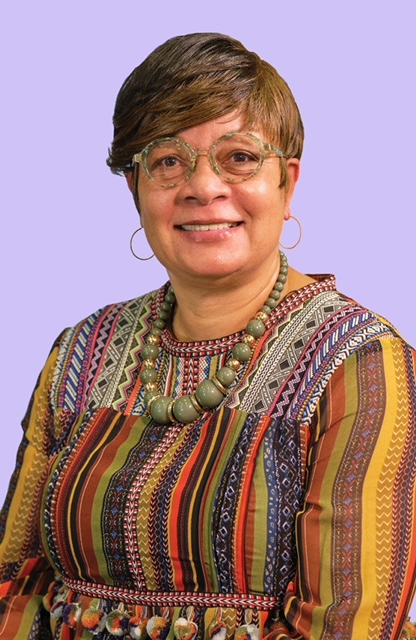
Early voting for the election began on April 19 and runs through April 27 with Election Day on Saturday, May 1.
Why rerun for the Tyler ISD board of trustees?
I taught in Tyler ISD for 38 years. So that’s hundreds of kids coming through my classroom, parents, strategy, problems — all of those things came through the classroom. So when I was asked, I was like, “That’s an extension of what I’ve been doing for 38 years, so why not?” I said, “I know kids, I know parents, I know education, so what better person?” That’s what made me decide to do the next level.
So far in your service as a trustee, which has been fairly short, what moments or achievements are you most proud of?
The name change is definitely a proud moment. I’m also proud of the fact that TISD decided to keep [in person] school. In spite of all the challenges with COVID, our students are our main concern, and they were not progressing as well as we would want them to, because they were at home or they didn’t have internet connection or they weren’t getting on.
Making that bold step to say, “Hey, we’re going to go face to face. We’re going to face the challenges of COVID, but we want our students to succeed.”
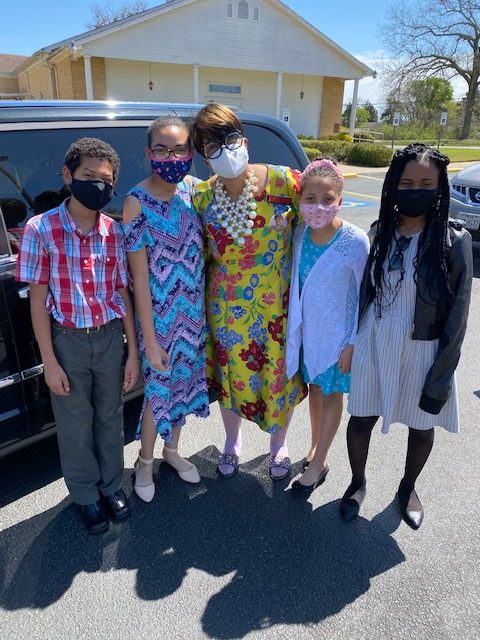
What were the biggest challenges Tyler ISD has faced during your term so far? What challenges do you predict moving forward?
The challenge of the name change, that was a big challenge — not only changing the name, but what to change the names to. And then of course COVID is a challenge because of educators, teachers, parents, grandparents, the disenfranchised. You have all of that going on. That’s a challenge because we want people to be safe.
We want to be concerned about the employees, the teachers, the administration, and we want kids to be safe. That was a challenge trying to figure it all out, trying to make sure custodians have what they need, trying to make sure that the schools were clean and sanitized and trying to make each student had what they need in order to be successful.
And then I see in the future, which we’re working on, is closing that achievement gap. That’s important for the whole district. Some of us do well, and some of us don’t, and that affects the whole district. So we want to make sure we can close those educational gaps in reading at a young age.
I liked the challenge of being able to do different resources to not just help those that are disenfranchised, but to help students succeed. If you can’t read, you can’t succeed. We need to start at a preschool level, getting those phonetic skills. We need to hit them early.
I liked the literacy bus that they wrote the grant for. That’s going to go around and kids can come in and read and they can check out books. It’s giving them a happy place to know that reading is happy. Reading is important, and I want all students to feel comfortable in reading.
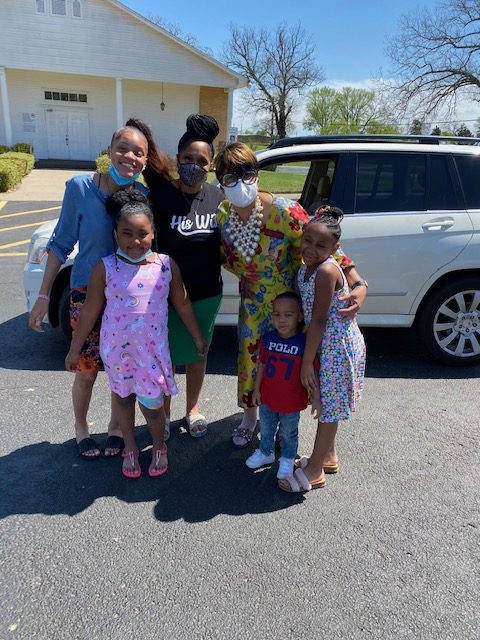
How has teaching within this school district for nearly 40 years given you perspective with issues you have faced in the past or will potentially face?
I’ve worked at a number of challenging schools and I’ve worked at “privileged” schools.
You see the challenge of behavior problems. You see the challenges of students wanting to learn how to read and you see the challenges of those things where they’re not interested. I wanted to be a vehicle as a teacher to help make learning fun, to make it accessible, to make it where they want to be at school.
I think especially during COVID children have a lot of emotional needs that we’re going to have to meet. This is a challenging time. If this is challenging for adults, can you imagine students that go to school. They want to be social, and they can’t be social the way they want to.
As an educator in TISD, I’ve learned to show students that teachers care about them. We care about the outcome. Not only educational wise, but if I could help somebody by buying a pair of shoes, if I could help somebody by paying for their lunch. I know a lot of educators that do that. We not only see about the academics, but we see about the physical needs.
My children used to ask me, “Mama, is this for us or for the kids at school?” And I would tell them, “We have, so let’s help those that don’t have.” It’s important that people know not only are we there to see the educational needs, but a lot of teachers help with the physical needs.
We have combed hair. We have gone out to purchase things that nobody knows about. And that’s what I like about education in Tyler. You can help all facets of people educationally and economically. That’s what I love.
As I’m sure you know, Gov. Greg Abbott recently lifted the mask mandate. What are your thoughts on that in relation to TISD?
We talked about that in a board meeting and I love that the superintendent said, “If it’s working, don’t stop it.” And so it’s been working for us. We’re almost to the end of the school year, why stop it?
I still wear my mask and I’m conscious that I have an effect on other people. I think it’s great. We should keep it until the end of school and then see where we go from the summer, how things are going. But I want our kids to be safe. I want our teachers to be safe.
One thing happens and we say, “We could’ve should’ve would’ve,” that’s not good. Hey, if it’s working, if it’s not broken, don’t fix it.
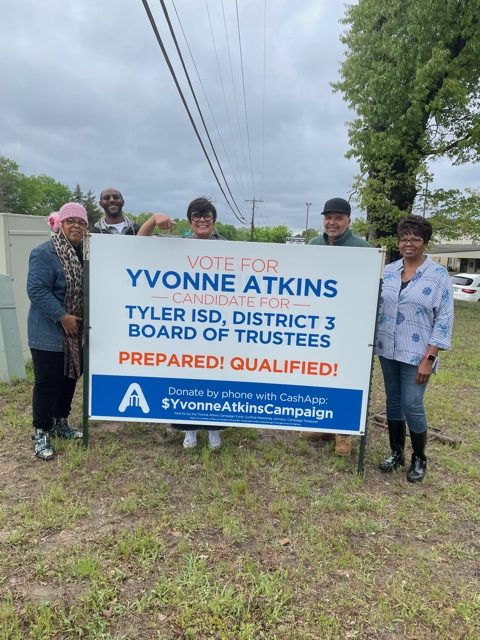
I saw you have a Bachelor of Arts and Education and a Master of Science and Community Mental Health, among a few other degrees. How might these skills assist you in your continued journey on the school board?
It’s, of course, in education, because the school board deals with education. All of that knowledge about reading and about things for education is helpful, because I’m in on the decision-making.
If they decide we need to do this curriculum for reading, I can say, “Oh, it works or it doesn’t work.” I can go in and be a tutor and help. I did Community Mental Health, because that’s important. Mental health is just as important as our education.
I wanted to know how I could best serve students with counseling techniques, community needs techniques. I did community mental health, because that will help on the board, when we’re talking about adding counselors or kids having behavior problems or going to the DAEP behavior school.
I have that background where I can help. And then of course, I went back to UT Tyler and got my master’s in reading, because I was just stumped at why some students cannot read. I wanted to go back to school to learn more techniques and to see what research says and try to help in that area as well.
What do you see as Tyler ISD next most important steps moving forward?
Of course seeing how the virus affects our students, that’s an important step, emotionally. [Also] how (the pandemic) affects our hybrid learning. Did the students that opted to stay home because of medical reasons or whatever, are they caught up? Are they where they should be? All the students still have a computer, but do all students have access to great internet?
We want to make sure that if anything happens, like the snow storm that was unexpected, could students switch quickly to hybrid learning where they won’t miss a beat. Can we jump into hybrid learning and our kids don’t miss a beat, or can they come face to face and feel comfortable?
And again, closing the gap is going to be a challenge. Did they lose any ground because of COVID? Did we lose any ground?
We don’t know what the future holds from COVID deaths. I know I had a lot of people to die. I don’t know how many students have had grandparents or loved ones to die. And that affects a lot of things. All of those things are going to come up, and we’re going to have to as a board face those challenges and do what’s best for Tyler ISD.
I saw that you had two children who attended TISD. What was among their most positive experiences and by contrast their least positive?
My son and my daughter, they loved school. I lived in a neighborhood that they should have gone to Moore, but since I was a teacher, I wanted them to go with me, and at the time, I was teaching at Clarkston.
They were smart kids. Paula, my youngest, she was my little radical person that would speak out. “Why do we not have this in north Tyler? Why do they have that in south Tyler?”
I would have to say “When you go to school, your job is to learn, your job is not to teach the class.” She always wanted to do what was right. When we went to Moore, she got killed in a car accident.
We were coming home from a pizza party and we were taking a friend home and the guy hit us. It so happened that the guy was white, and he hit us, and she got ejected out of the vehicle, and she ended up dying.
My son, Paul, was with us in the car. We had to go to trial. We had to do all of those things and it was really upsetting, because it was an accident, but he ran the red light.
Being a teacher’s child is difficult enough, but then that happened. It happened when Paul was in eighth grade and Paula was in seventh grade. By the time he went to trial, he was a freshman in high school.
They flourished in TISD. My son graduated ninth in his class. He always did well. He was in the IB (International Baccalaureate) program.
That dynamic changed our whole family life, of course. It was my only daughter. Paula was an October baby. So she went to school in September [when] she was only five.
She passed all these tests, ao she was able to go [to kindergarten], but when it came to her birthday and she said she was six, the teacher questioned her. She says, “You can’t be in this room if you’re just now turning six.” And she said, “I’m here. So evidently I can be here.” So stuff like that.
Or back then they had mastery tests. You had to pass so many mastery tests. She was passing them two a week, but the teacher never gave her any accolades. That was challenging to me, because she’d say, “Mama, no matter how much I try, I don’t get positive feedback.”
And I said, “It doesn’t matter. As long you know and I know, and this family knows that you are doing your best and you are out shining some other lights, then that’s all you worry about.”
They did deal with a few racism things. I always told them, “You have to overcome it.” I was a Black teacher at Clarkston by myself for about eight years. I want kids to know that you could be a teacher; you don’t have to just be a custodian. You can be an educator, not that anything’s wrong with being a custodian.
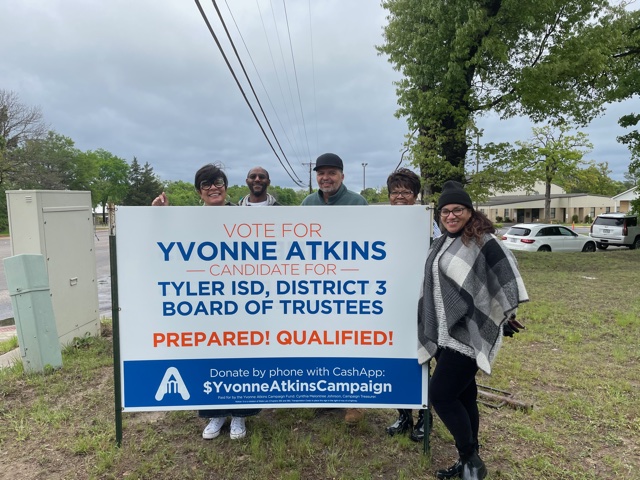
Thank you for sharing. I understand this is something that has impacted you the rest of your life. How might you reach out to residents whose children are in Tyler ISD to campaign and hear their feedback?
Campaigning during COVID is kind of challenging, that’s the one thing. A lot of organizations try to have meetings on Zoom. I signed up for those where we can talk to the community. I’ve been on the radio station where they could call in and ask questions.
And we’re going to try to have a meet the candidates on Saturday in my neighborhood, at my house, a drive by. People are going to pass out flyers, try to walk and knock and say, “Please vote for Yvonne Atkins.” So that’s a chance for them with COVID. We have a meet and greet at St. Louis [Baptist Church] where people can come through and ask questions.
I can’t fix everything. I don’t know everything, but it’s listening to their concerns, and I can take those to the board.
What do you hope to bring to the board that your opponent Ray Alexander does not?
I hope to bring the experience. I’ve been there on both sides of the fence. I’ve been a teacher and I’ve been a parent. I’m a concerned citizen about what’s going on in the different schools.
I bring experience, I bring honesty, transparency, and I bring my educational background. And my love for children and my concern for parents and the concern for the community and the concern for students that are not excelling the way they should be.
I like the thought that in every school, I left it better than it was before I came. I want to do that to the board. I want to leave things better than what it was or what they will be when I’m gone.
I bring that drive, that excitement, that challenge. I think I bring that to the board. Hopefully I do.
If you had to pick one thing for people to know about you, what would it be?
That I’m caring, that I’m a people person.
Sometimes people think that when you take a public office that you don’t care about people. I want people to know that we do care, we do listen. This is a voluntary position. I don’t get paid. I don’t get a check at the end of the month, so I’m not doing it for pay.
This is strictly because I want to help not only my community but all the students. I care about all the students at TISD and all the employees. I was once one of those employees.
Final question: Is there anything else important to address that hasn’t come up yet? Anything you want people to know or understand?
I want them to know that not only am I trying to do what’s best for the students and TISD, but the whole board is working together to try to do what’s best for all students.
Because like I said before, if all of us are not successful, none of us are going to be successful. We want to be an A plus school district.
Zoe McGhee is a junior at The University of Texas at Tyler studying Mass Communication. She is the managing, newsletter and copy editor for The Patriot Talon, the independent student-run newspaper designed to inform and entertain UT Tyler students and staff. McGhee is also part of The Tyler Loop’s newsletter staff.
Love what you're seeing in our posts? Help power our local, nonprofit journalism platform — from in-depth reads, to freelance training, to COVID Stories videos, to intimate portraits of East Texans through storytelling.
Our readers have told us they want to better understand this place we all call home, from Tyler's north-south divide to our city's changing demographics. What systemic issues need attention? What are are greatest concerns and hopes? What matters most to Tylerites and East Texans?
Help us create more informed, more connected, more engaged Tyler. Help us continue providing no paywall, free access posts. Become a member today. Your $15/month contribution drives our work.







